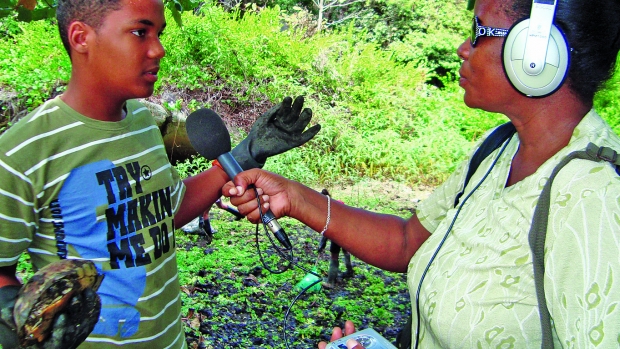Grants :: Small Grant Facilities :: Rehabilitation and sustainable management of the North-East Point marsh
Rehabilitation and sustainable management of the North-East Point marsh

Radio programme on site with SSA members, Seychelles © MFF
Objectives
This project had three objectives:
- to control water lettuce and other invasive plant species threatening the endemic terrapins, fish and plant species of North-East Point marsh;
- to enhance partnerships between NGOs, government and the community for conducting environmental activities; and
- to engage Seychelles Scouts Association members in tending, survey and research work, and in sensitizing the local community to the management and conservation needs of North-East Point marsh.
Background
Wetlands are a critical ecosystem in the Seychelles. The Department of Environment (DOE) and the Seychelles Scouts Association (SSA) understand the need to conserve wetlands, which, despite their known importance, are under constant threat from human activities as competition for land intensifies. Moreover, the marshes of the Seychelles are threatened by invasive plant species, principally the water lettuce (Pistia stratiotes) and water hyacinth (Eichornia crassipes). Both species spread quickly, blocking sunlight and depleting the water of oxygen, thus affecting endemic plant and animal species. They also reduce the aesthetic values of wetlands.
This SSA project aimed to address the negative effects of development projects, unsound business practices and the spread of invasive plant species on Mahé’s North-East Point marsh. The project was designed in line with national policies, as the Department of Environment is actively involving various groups, especially young people, in protecting the marsh and educating people about its values. The marsh has social and economic value because it is near a popular beach. It also has potential for ecotourism, and provides habitats for a number of endemic plant and animal species.
Target beneficiaries
The direct beneficiaries were 25 Scouts, both boys and girls, two Scout leaders, two programme coordinators, and three casual labourers from the district. Indirect beneficiaries included the small community next to the marsh, the Scouts network, and the DOE.
Outputs
- Clean-up of the North-East Point marsh and subsequent maintenance of the wetland to prevent growth of water lettuce and water hyacinth.
- Involvement of the people from the project district in the management of the marsh.
- An inventory (number and types) of plants and animals found in the marsh.
Accomplishments and challenges
The project introduced young Scouts members to environmental management activities and conservation values. It provided a venue for the newly introduced environment component in scouting (especially in the Seychelles). The Scouts and their leaders had the chance to speak with local people about how unsound business practices were negatively affecting the wetland ecosystem, a new experience for Scouts in the Seychelles.
Although the project team was small, it managed to delegate work on a rotational basis while ensuring consistency and adequate monitoring of the project. A local person from the community helped the young Scouts each time they visited the site. Staff from the DOE provided effective support, and participants were motivated throughout and alert to special features or species in the wetland.
Challenges
The group fears that if they do not visit often, the marsh could again become a community waste dump. The timing between site works was also a concern for the Scouts leadership, DOE and the MFF NCB, as invasive plants grow quickly and fill the marsh with debris faster than they can be cleared. The SSA hopes that the community awareness campaign will help reduce these threats. The Scouts are also organizing other community-based groups such as the Wildlife Clubs of Seychelles to join them in sustaining their effort.
Contributions to cross-cutting themes
Communications
A documentary is being filmed about the project, and SBC radio broadcasted a programme entitled The North-East Point Wetland, a 20-minute report aimed at raising awareness about the wetland and why the Scouts were restoring and maintaining the site. An information brochure on the importance of wetlands, the Scouts’ environment programme, and partners in conservation, was also produced. The brochure includes information on the MFF project, and how the project contributes to the important wetlands in the area.
Gender equality
The Scouts leadership and membership are a mix of men and women, including children of both sexes and all age groups.
Climate change
The work begun by this project marks the start of a longer-term action to ensure the marsh functions naturally for the benefit of both wildlife and the surrounding community. Wetlands remain a critical ecosystem, which if healthy can greatly reduce some of the impacts of climate change.
Lessons Learned
This project was a holistic venture for Scouts members, as it allowed them to learn about and benefit from the experience of professionals in the field, as well as join workshops that broadened their theoretical understanding of wetlands and their functions. The Scouts learned techniques for maintaining ecologically important sites and for social research and data collection (such as the inventory of flora and fauna in the marsh, raising community awareness through discussions, and local site visits).
Close collaboration with the community yielded positive results, but one of the planned results (no invasive plant species in the marsh) proved over-ambitious. Project managers found that the aggressive growth of invasive weed species makes them extremely difficult to eliminate.
Project Facts
Country
Location
North-East Point, Mahé, Seychelles
Topic
- Knowledge for Management
- Civil Society Engagement
- Capacity Building
- Knowledge management and communications
- Gender equality
- Climate change
Duration
1st Aug 2010 to 31st Dec 2010
MFF Grant Amount
US$11,900
Co-financing Partner
The Seychelles Department of Environment made an in-kind contribution through facilitation, consultation, guidance and equipment (as stipulated in the Memorandum of Agreement signed at the start of the project).
Implementing Partner
Mrs Valerie Savy
Scout Environment Ambassador
Mr Francis Accouche
National Executive Coordinator
Seychelles Scouts Association (SSA)
Place de la Republique, Victoria,
Mahé, Seychelles
Tel: +248 225886
Fax: +248 324131
Email: seyscouts@yahoo.com
“This was the first time that our environment project received financial support from MFF. It was a great help for us in responding to our principles, especially in providing opportunities for us to connect to the natural world through environmental education and on-the-ground action.”
— FRANCIS ACCOUCHE
SSA COORDINATOR
